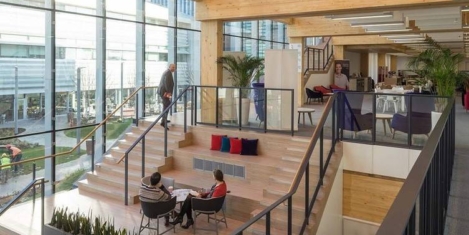October 31, 2018
Conversations may be more productive when held in the great outdoors
 Conversations are more responsive in natural environments such as parks and gardens than indoors, finds new research by the University of Manchester and Cardiff University. The researchers recorded conversations between three- and four-year-old children and their parents while they explored a city park and the park’s indoor education centre and found that the conversations in the park were more responsive and connected compared to those recorded indoors. The study ‘Responding to nature: Natural environments improve parent-child communication’ is published in the Journal of Environmental Psychology.
Conversations are more responsive in natural environments such as parks and gardens than indoors, finds new research by the University of Manchester and Cardiff University. The researchers recorded conversations between three- and four-year-old children and their parents while they explored a city park and the park’s indoor education centre and found that the conversations in the park were more responsive and connected compared to those recorded indoors. The study ‘Responding to nature: Natural environments improve parent-child communication’ is published in the Journal of Environmental Psychology.









 Two-fifths of job-seekers are being hired into new roles only to discover they have the wrong soft skills for the job. This means over half are leaving companies because their personality or work style didn’t fit, claims news research published by HireVue. The 53 percent of those who had left for this reason saying the format of the hiring process had prevented them from discovering the mismatch earlier. While four-fifths (82 percent) of candidates are confident in their ability to articulate their soft skills and personality traits in an interview, many doubt that pre-hire assessments can showcase these important attributes.
Two-fifths of job-seekers are being hired into new roles only to discover they have the wrong soft skills for the job. This means over half are leaving companies because their personality or work style didn’t fit, claims news research published by HireVue. The 53 percent of those who had left for this reason saying the format of the hiring process had prevented them from discovering the mismatch earlier. While four-fifths (82 percent) of candidates are confident in their ability to articulate their soft skills and personality traits in an interview, many doubt that pre-hire assessments can showcase these important attributes. 




 The new northern home of the BBC is giving London a run for its money when it comes to siting offices for the UK’s top tech talent, with Manchester leading the way, according to
The new northern home of the BBC is giving London a run for its money when it comes to siting offices for the UK’s top tech talent, with Manchester leading the way, according to 




















October 26, 2018
We need to move on from the stigma of mental health to finding solutions
by Gary Helm • Comment, Wellbeing
(more…)